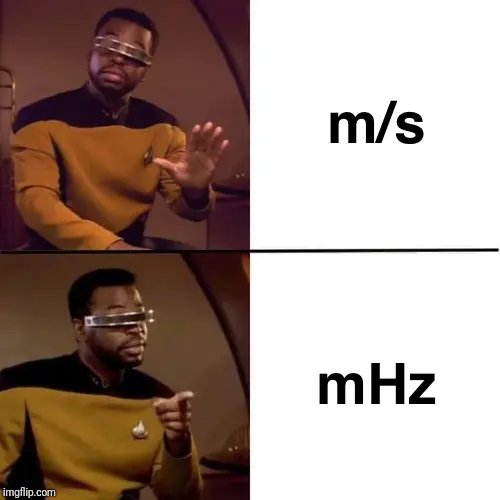Same order of magnitude, don’t bother with the trivial details.
Is it really tho? log(3.6) ≈ 0.55 so 1 km/h is really closer to 10m/s than 1m/s
This is actually pretty important to being able to solve engineering problems in the real world. Invariably, every little sub industry has its own cursed unit system. And dimensional analysis is great for solving real problems on its own.
And if you get to a high enough physics level, they start setting hbar = c = 1 or G = c = 1, and you never have to worry about it again.
I’m the mean time, it’s worthwhile to learn the trick to do this stuff fast-ish.
I would like to introduce everyone to this video about cursed unit (youtube link warning)
kWh has an intuitive reason. Watts are so small that you’d always calculate consumption in MJ and whatnot, and seconds are so short that you’d always be expressing time in ks. Using kWh will reduce the numbers to useful ranges and makes cancelling M and k unnecessary.
Yeah, he elaborated it in his second video about the cursed unit that cursed ≠ useless.
I dislike that my highschool never once gave me the concept that units can simply be treated like constants to be cancelled out.
I used to do the conversions for each variable before putting them in the equation like a fool.
Now I’m slapping all of the conversions alongside the original values/units in a single expression like god intended.
It isn’t even that much of a time waste you just multiply 1000/3600
But it would take me a couple of hours to figure that out.
Have you tried converting those hours to seconds?
That Hertz
I hate it when they do it !
Just divide by 3.6
Example:
10 km /h * 1000 m / km = 10,000 m /h
10,000 m/h * 1h/3600s = 10,000/ 3,6000 m/s = 10/3.6 m/s
Shit like this is why we need metric time.
Shit like this is why metric needs to be replaced with a base12 system. Base10 is for children who still count on their fingers.
Dozenal for the win !!! It will never happen though, but dreaming is allowed
don’t speak like the french
I used to do it this way in highschool, but could never remember if it was divide by or multiply by 3.6
Instead I now do it as you have shown, except it all goes in the same expression.
10 km/h * 1000 m/km * 1h/3600s = 2.778 m/s
No need for the extra steps. Slap it all in the same expression and put it in the calculator (being careful to check that the units cancel as intended)
M/s is faster (lower number) than km/h so… That should give you enough explanation to understand whether you need to divide or multiply 3.6 when converting.
Wait what, jow many kilominutes per hour is one mile per stone?
African or European swallow?
Unladen or not?
The true evil are the fuckers who post recipes in grams instead of cups and ml.
I don’t have time to get out a million little differently sized utensils because I need 2 cups of this, ¼ cup of that, ½ a teaspoon of the third thing etc. when I can put the bowl on a kitchen scale and use the tare function.
But I love that 😫
In a parallel universe, someone is memeing about how teachers waste our time on useless stuff and never taught us to convert between units.
Don’t ky/s over unit conversions OP. It’s not that hard.
I’ll be pissed if the comments are about metric units

✋ 1 bit
🖖 125 millibytes
mbps, milli bits per second
Thanks, I hate it
That’s interesting. Obviously, you’d put a center dot to disambiguate millihertz from meter-hertz, but I can’t recall ever having learned a rule about that. So some combinations of units are inherently ambiguous?
Also: Hz/dpt.
I can’t tell which unit is more cursed: millihertz or meter hertz. Surely, anything that could be measured in millihertz is more natural to measure as a period, or as revolutions per minute or something, right?
EDIT: Also, TIL about dpt. Thanks!
A dioptre (British spelling) or diopter (American spelling), symbol dpt, is a unit of measurement with dimension of reciprocal length, equivalent to one reciprocal metre, 1 dpt = 1 m^−1.
Speed as meter per hertz is a rather odd case, like with a machine that goes in discrete steps.
In any case, I never use implied multiplication (and others) and always simply put everything where it should be.
Speed is metre hertz rather than metre per hertz. Metres per hertz would measure absement, which is a measure of how far away something is from a start point and for how long. So being twice as far away for half the time would be the same amount of absement.
Yes, sorry for the little error, my point is that m*Hz it is not generally speed but only in specific cases. Hz is not just “per time” but “something occurring x times per time”, like a frequency or revolutions. You can not use it for regular speed, it has to be a periodic event. That is how it is defined:
The hertz is defined as one per second for periodic events.
This is why we have Becquerels to count decay events, which are random and not periodic, but the unit is also 1/s. And for the same reason you can not use m*Bq as speed.
I never knew that Hertz requires a periodic event. Thanks for that and the Becquerel explanation!
You know, I always figured optometry involved like, super complicated math and shit.
Turns out it’s just basic arithmetic.
Kinda like programming, in a way.
Yeah, from my experience ordering glasses, it’s mostly about making sure the lenses are aligned with my retinas to focus the light in the right spots. All the numbers are just a way to formalize those measurements so that the lens maker gets it right
My last optometrist refused to tell me what my prescription was. I should have insisted, they’ve since closed up shop.
TIL about dpt
Tell me you don’t glasses without telling me you don’t need glasses :D
I actually do have glasses, I just never bothered learning about any of the technical details behind my lenses. Optometrist measured my eyes, I chose the cheapest frame the store offered, came back a week later to pick up the glasses and that’s about it.
Something that occurs once a hour has a frequency of 277.777… μHz
Saw a video using mHz recently and it took way too long to realise the readout was correct and nort a typo of MHz …
Metre hertz? Lol
Millihertz
Just multiply by (1000m/1km)(1h/3600s) and cancel out the units, kids








